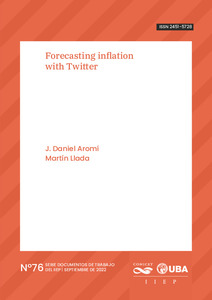Por favor, use este identificador para citar o enlazar este ítem:
https://repositorio.uca.edu.ar/handle/123456789/18354| Título: | Forecasting inflation with Twitter | Autor: | Aromí, José Daniel Llada, Martín |
Palabras clave: | MACROECONOMÍA; INFLACION; REDES SOCIALES; DEVALUACION; TWITTER | Fecha de publicación: | 2022 | Cita: | Forecasting inflation with Twitter [en línea]. Serie Documentos de Trabajo del IIEP. 2022, 76. Disponible en: https://repositorio.uca.edu.ar/handle/123456789/18354 | Resumen: | Abstract: Inflation has become a central topic in macroeconomic analysis. In this context, there is high value in expanding our ability to monitor and, more importantly, anticipate inflation dynamics. Social media content emerges as a potentially valuable tool to advance this agenda. That is, the large volume of messages exchanged in public discussions can be used to extract information regarding the likely path of inflation dynamics. In this study, we analyze public discussions on the micro-blogging site Twitter. Our study focuses on the case of Argentina. This is a particularly interesting case of study since this is an economy where inflation has been a recurrent and highly disruptive phenomenon. The empirical evidence indicates Twitter content anticipates inflation. More specifically, a simple indicator of the level of attention allocated to inflation provides valuable information regarding inflation levels and inflation uncertainty. Estimated forecasting models indicate that an increment in the attention index are followed to statistically and economically significant increments in expected inflation. Out-of-sample forecasts confirm that the index allows for gains in forecast accuracy. Complementarily, higher values of the attention index anticipate increments in inflation uncertainty as approximated by the interquartile range of next month inflation forecasts. The information gains are different from and compare favorably with the information provided by lagged inflation and lagged devaluation rate. Also, analyses show that these information gains are substantive compared to those that result from using traditional macroeconomic indicators such as the level of economic activity, monetary aggregates and interest rates. Furthermore, the information content of four alternative indicators of expectations are also evaluated: Google search Volume, newspaper content, mass media tweets and a consumer survey. These analyses confirm that social media data constitutes a particularly valuable source of information regarding future inflation. | Cobertura Espacial: | Argentina | Cobertura Temporal: | SIGLO XX | URI: | https://repositorio.uca.edu.ar/handle/123456789/18354 | ISSN: | 2451-5728 | Disciplina: | ECONOMIA | Derechos: | Acceso abierto | Fuente: | Serie Documentos de Trabajo del IIEP. 2022, 76 |
| Aparece en las colecciones: | Artículos |
Ficheros en este ítem:
| Fichero | Descripción | Tamaño | Formato | |
|---|---|---|---|---|
| forecasting-inflation-twitter.pdf | 1,53 MB | Adobe PDF |  Visualizar/Abrir |
Este ítem está sujeto a una Licencia Creative Commons

